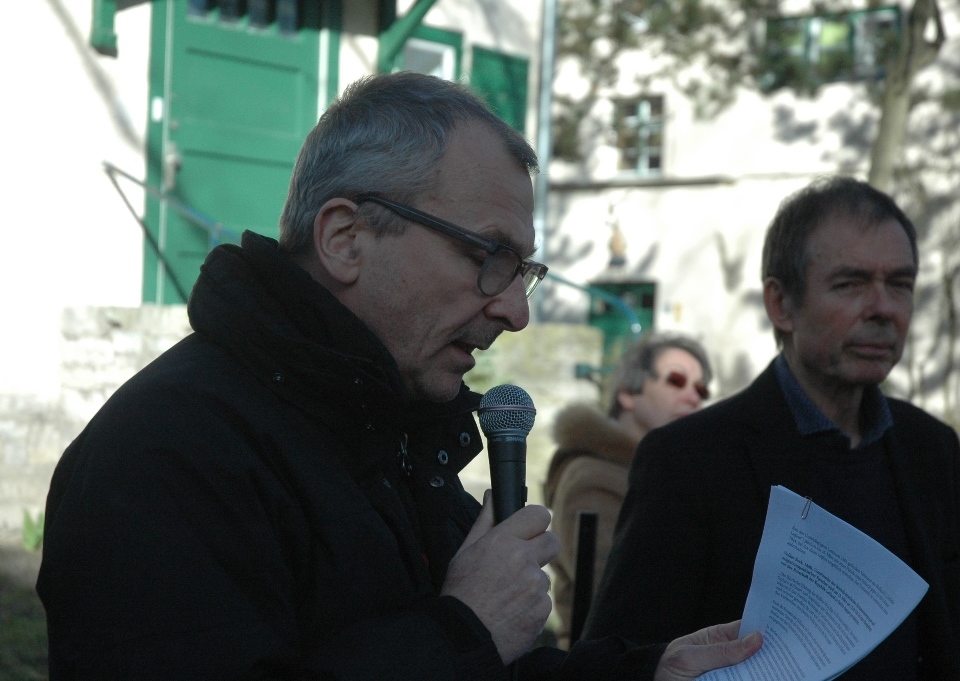LATVIA | GERMANY | WAFFEN SS MARCHES IN RIGA | BALTIC MARCHES | GLORIFYING COLLABORATORS
◊
by Monica Lowenberg (London)
Last Wednesday, on 15 March 2017, eve of the annual events glorifying Latvia’s Waffen SS in the very heart of the capital city, Riga, one German member of parliament (the Bundestag), Volker Beck, came to the Latvian Embassy in the heart of Germany’s capital, Berlin, to give a speech of support to the protesters. Beck, a member of the Greens, is president of the German-Israeli Parliamentary Friendship Group. The following is the text of his speech, which I have translated into English.

Volker Beck gives a speech of support to protesters at the Latvian Embassy in Berlin on the eve of the 2017 annual Waffen SS march in central Riga. PHOTO: LOTHAR EBERHARDT.
Since 1998 on the 16th of March and every year, in the very center of Riga, Latvia, marches have been regularly held to praise the “heroism” of the former Latvian Legion, i.e. Waffen SS veterans in their combat against the Red Army in 1944 with the intent to halt the Soviet advance.
For me the yearly honoring of the Waffen SS in Riga is insufferable. Perpetrators are made to be victims and survivors of the Shoah and mass crimes that took place in Latvia during the Second World War are repeatedly injured through this annual commemoration, their suffering trampled over and the memory of the Shoah and the crimes committed dragged through the dirt.
Of Latvia’s pre-war Jewish population, 95.6%were killed in 1941-42, just less than one in ten survived. Riga was, moreover, one of the prime places where Berlin Jews were killed. Today in front of the Latvian embassy in Berlin I protest against this wholly unacceptable commemoration.
Yes, the history of the Baltic states is complicated, in particular the time when the Baltic States were occupied by the Germans and then the Soviets. It is a history mired in controversy. However, one thing is true. The Latvian Legion was formed in the winter of 1943 and March 16th of 1944 is the day the Legion was founded, the day when Hitler ordered it to be established. There is consensus among all Latvian historians that the day marks the only time when the two Divisions of the Legion (15th and 19th, the two Waffen SS divisions) fought together against the Red Army. Therefore, by making the 16th March a day to remember war dead, Latvians, (despite Latvian official protestations to the contrary), are making it in fact a day of commemoration for the day when Latvian volunteers fought in the 15th and 19th divisions of the SS.
Approximately 67,000 Jews were living in Latvia at the time of the Nazi invasion in July 1941. Approximately 62,000 of them were killed during the Nazi occupation. About 30,000 Jews were killed already by mid-August 1941. The main agents of this murder were small German military units joined by the so-called Arājs Commando and assisted by Latvian auxiliary police, which consisted mainly of volunteers. In late 1941 approximately 30,000 additional Latvian Jews were killed in a carefully organized execution using the “sardine method” also aided by Latvian police and Arājs Commandos in Rumbula forest, just outside the capital city Riga. After this, about 25,000 European Jews were brought to the Riga Ghetto by train and at least half of them were murdered by mid 1942. After this blood fest the murderers, Latvian Arājs commandos and auxiliary police, then freely joined the Latvian SS Legion (the 15th and 19th divisions), in 1943 and 1944. These are the facts that no one can deny.
To be able to develop a Latvian national consciousness it is necessary to take on board this difficult chapter in history and be able to criticize it. National pride should never take precedence over human rights.
Even here in Germany we have fallen short when sentencing German war criminals and treating them accordingly. During the postwar justice system such men were not only widely spared but were even perceived as victims, while today, survivors of Nazi crimes and their descendants have to still fight hard for restitution rights.
On the 27th of January 2017, in response to my question regarding pensions that continue to be given to Nazi war criminals, among them members of the SS and their relatives, the German government stated that no change to the system is anticipated. The federal government’s stubborn refusal to even concern themselves with this matter is an unacceptable way of turning perpetrators into victims. The Federal government should no longer be giving pensions to former concentration camp personnel and other war criminals.